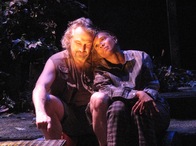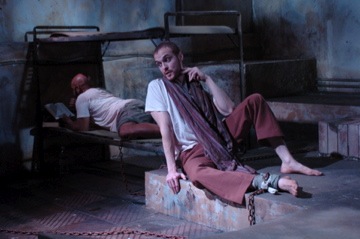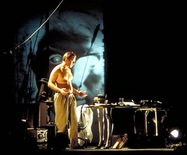|
Jacqueline Lawton: What was the first play that you ever directed? What did you learn from that experience that remains with you today?
Juanita Rockwell: Sam Shepard’s Action was my first full production, at Colorado College. I had become interested in how language creates and shapes us – I still am. I had two professors who knew a great deal about theatre – Harvey Rabbin in philosophy and Herving Madruga in. They were so brilliant and so supportive of these explorations of mine that didn’t seem to fit into the school’s theatre curriculum. I pursued a self-created major in theatre and semiotics, and they found money from their own departments to help me produce Action as well as for a subsequent production of Genet’s The Maids. I learned that I wanted to work in the space between disciplines and genres, that I didn’t need to work inside the given system and that allies can come from all sorts of places. JL: Why did you decide to get into theatre? Was there someone or a particular show that inspired you? JR: I was drawn to a variety of art forms, growing up, but one pivotal moment for me was shortly before that at Goddard College, working with Meredith Monk, Laura Dean, Steve Reich, Nora Guthrie, Steve Paxton, Eric Salzman, Ken Rubenstein, Paul Vela… The seventies were a rich time for experimental and interdisciplinary performance, and exposure to these giants of theatre, music and dance transformed my perspective irrevocably. JL: What kind of work do you do to pay the bills? How do you balance this work with your work as a director? JR: I’ve taught in Towson University’s MFA in Theatre program since serving as its first artistic director in ’94, and have taught in Wilkes University’s low-residency MA/MFA in Creative Writing since consulting on its development in ’03. It was difficult to balance much of anything when I was directing the program at Towson, but I stepped down from the director’s position a few years ago and then went to half-time. So now I’m working on balancing my teaching gigs with directing, writing and life. It’s actually more challenging for me to have so many different sorts of projects going on, but it’s a good kind of challenge. I find meditation practice a big help. JL: In DC, we have the Capital Fringe Festival, the Intersections Festival, the Source Festival, the Kennedy Center's Page-to-Stage Festival, the Black Theater Festival, and the Hip Hop Theatre Festival. We also have the Mead Lab at Flashpoint Theater Lab Program. Have you participated in any of these? If so, can you speak about your experience? JR: I’ve worked as a playwright at a couple of these festivals, but it’s a very different thing to direct in them, as the director is so often producing. I did a lot of producing, both freelance and as Artistic Director of Company One Theater in Hartford, CT, when I was younger. However, as the years go by, I’m less inclined to do that. I did direct Jennifer Nelson’s terrific 24, 7, 365, produced by Theatre of the First Amendment at three different theatres, including at the Atlas as part of Intersections 2011. The people at TFA were terrific collaborators and producers, and I’m sad that this wonderful theatre closed its doors this year. JL: How many plays have you directed in the DC area? How many of them were written by women? By playwrights of color? How conscious are you selecting plays by women or people of color when deciding your season? JR: In recent years: in addition to directing Jennifer’s 24, 7, 365 at TFA, I directed your fab Mad Breed at Active Cultures! I also directed a staged reading of Laura Jacqmin’s Ski Dubai for the Dramatists Guild Conference at GMU. If you add Baltimore to that, I directed Frank McGuinness’ Someone Who’ll Watch Over Me and Lee Blessing’s Going to St. Ives at Everyman, Lisa d’Amour’s Red Death at UMBC, seven plays at Towson University, and I co-directed Naoko Maeshiba’s Kawa To Kawa at Baltimore Theatre Project. And then you have to go back a lot of years for the last times I was freelancing in DC and directed Harvey Fierstein’s Safe Sex at Source and Beckett’s Play at DCAC. So I think that makes 16 plays in the DC region, ten of which were by women and seven by people of color. JL: How do you feel the DC theatre community has addressed the issues of race and gender parity? How has this particular issue impacted you and your ability to work? JR: In one’s own case, it’s often hard to know, of course. At some theaters I’ve noticed what looks like tokenism in both race and gender, but anecdotally, it seems to be getting better- I’d love to see the numbers for our region over the past few years. JL: If you could be direct at any theatre in DC, which would it be and why? JR: I haven’t directed my own work in quite a while, and I’d love to do that again, so it’s a question of finding a match – both personally and aesthetically. I’m working on that. JL: DC audiences are ... JR: Growing and shifting, which I think is really exciting. The more adventurous work that’s out there, the more their tastes will shift and change. I would love to see the lines between theatre and performance blur a bit more in DC venues, though. JL: DC actors and designers are … JR: I’m married to my favorite collaborator: musician/composer/sound designer/videographer Chas Marsh, but I’ve had fantastic experiences with many designers and actors in the region. I’ve worked with (and seen) many of the same designers and actors in both DC and Baltimore, and I love that our respective beltways seem to be permeable for both actors and designers. JL: DC playwrights are ... JR: A lovely bunch! People like you, Gwydion Suilebhan, Rich Espey and many others are doing so much to create a real sense of community among playwrights in the region. I hope we can continue to foster that community even as we keep our aesthetic doors open to outside influences. I would love to see even more connections between the DC and Baltimore worlds, for playwrights. JL: DC critics are … JR: I’ve been thinking a lot about the current role of criticism in the arts. We all know it isn’t about that handful of critics at the major outlets anymore. The blogosphere, the tweetiverse, Facebook: the internet has changed the game so profoundly (for better and for worse) that it’s hard to know what criticism even is these days. JL: What advice do you have for an up and coming DC based director or a director who has just moved to D.C.? JR: For early career directors, there are so many places to step up and direct these days, especially if you’re also ready to do some level of producing (such as all the festivals you mentioned earlier). My strongest advice to younger artists would be to make sure to keep developing your aesthetic by seeing work outside our region, as well as in it. For older artists, especially women, I’ll just wish you the best of luck, because it’s not easy. JL: What's next for you as a director? Where can we keep up with your work? JR: I’m directing Jordan Harrison’s Act A Lady for Iron Crow Theatre at Baltimore Theatre Project in May-June 2013. My website is www.juanitarockwell.com and I’m on Facebook until it finally annoys me enough to make me leave.
0 Comments
Your comment will be posted after it is approved.
Leave a Reply. |
My BlogI'm a playwright, dramaturg, and teaching artist. It is here where you'll find my queries and musings on life, theater and the world. My posts advocate for diversity, inclusion, and equity in the American Theatre and updates on my own work. Please enjoy!
Categories
All
Archives
June 2020
Reading List
|



